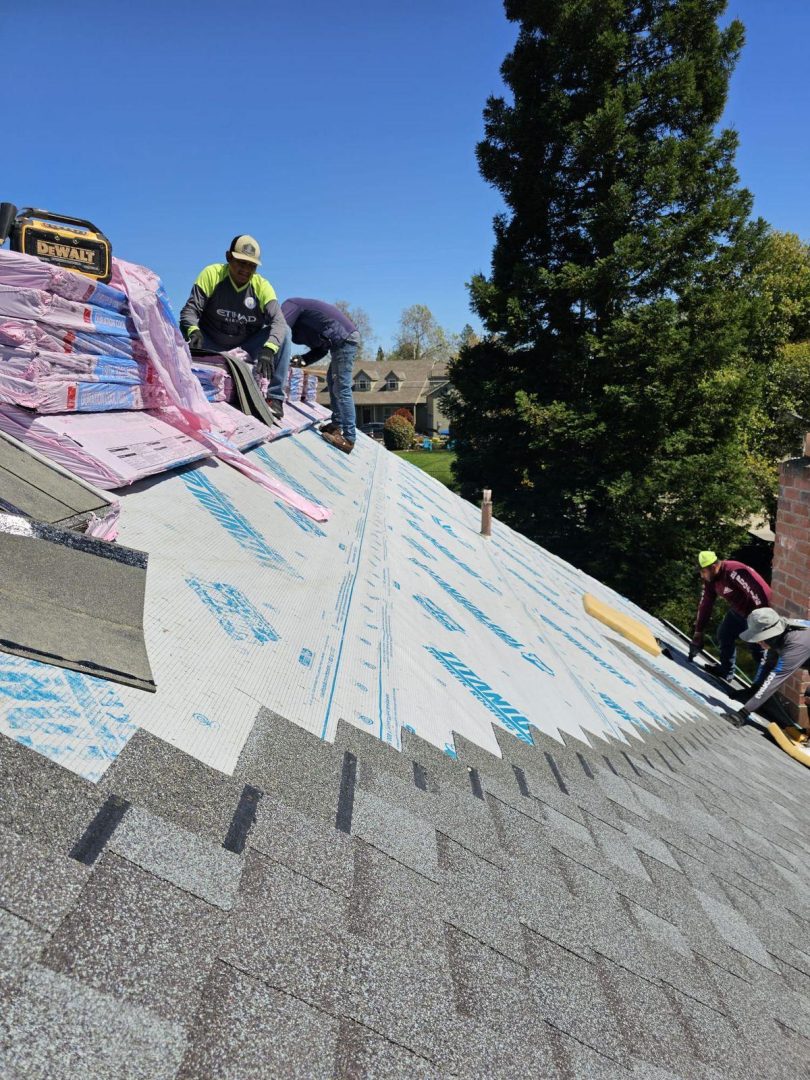Advertisements
The roofing industry plays a crucial role in the U.S. construction sector, as every residential, commercial, and industrial building requires a durable, well-maintained roof. With the nation’s construction boom, the demand for skilled roofers continues to rise, making it a promising career path for both U.S. citizens and foreign workers. In this post, we’ll discuss the growing need for roofing professionals, the process of visa sponsorship for foreign workers, and the various types of roofing jobs available.
The Growing Demand for Roofing
Roofing professionals play a crucial role in the construction industry, specializing in the installation, repair, and maintenance of roofs using materials such as asphalt, metal, and tile. Their work requires expertise in construction techniques, safety regulations, and material durability—skills that are increasingly sought after in the expanding construction sector. With continuous new developments and the need for repairs and renovations on existing structures, the demand for roofing remains strong. For immigrants, this thriving industry offers a promising path to a stable and fulfilling career in the USA.
Understanding Visa Sponsorship for Foreign Workers
What Is Visa Sponsorship?
Visa sponsorship is the process by which a U.S. employer petitions for a foreign national to work legally in the United States. This sponsorship ensures both the position and the candidate meet specific legal criteria. Common visa categories for employment include:
Advertisements
- H-1B: For specialized roles (e.g., engineering, IT).
- H-2B: For temporary or seasonal, non-agricultural jobs—potentially applicable to roofing if there’s a seasonal need.
How It Works
- Employer Petition: The U.S. employer files a petition with the United States Citizenship and Immigration Services (USCIS), demonstrating a legitimate need for a foreign worker.
- Labor Certification: In some cases, the employer must show that no qualified U.S. workers are available for the role.
- Visa Application: After petition approval, the foreign worker applies for the visa at a U.S. consulate in their home country.
This process can be extensive, involving wage standards, compliance with labor laws, and ongoing record-keeping obligations for the employer.
Types of Roofing Jobs Available
Residential Roofing
- Focus: Private homes, installing or replacing shingles, tiles, and other residential materials.
- Skills: Knowledge of local building codes, safety protocols, and basic construction principles.
- Salary Range: Typically $30,000–$60,000 per year, depending on experience and location.
Commercial Roofing
- Focus: Larger buildings (office complexes, malls, schools).
- Skills: Working with single-ply membranes, built-up roofs, modified bitumen, and strong understanding of drainage systems.
- Salary Range: Generally $40,000–$70,000 annually, reflecting higher complexity and responsibility.
Industrial Roofing
- Focus: Manufacturing plants, warehouses, and specialized structures.
- Skills: Certifications for working at heights, operating heavy machinery, knowledge of structural integrity.
- Salary Range: Often exceeds $50,000 per year due to specialized requirements and potential hazards.
Requirements for Foreign Workers in Roofing
Education and Training
- High School Diploma: Commonly required to enter the field.
- Vocational Programs: Offer focused training on roofing techniques, materials, and tools.
Apprenticeships
- Duration: Typically 3–4 years, combining classroom education with hands-on job training.
- Outcome: Certifications that significantly boost employability and credibility.
Safety Certifications
- OSHA Training: Essential for understanding and managing risks on a construction site.
- Other Certifications: Specialized programs in tool operation, fall prevention, or hazardous materials.
Meeting these requirements not only equips foreign workers with valuable skills but also helps them stand out to potential employers in the U.S. roofing industry.
Finding Employers Offering Visa Sponsorship
Utilize Job Boards
- Indeed, Glassdoor, LinkedIn: Use keywords like “roofing jobs with visa sponsorship” or “H-2B roofing positions” to narrow down relevant listings.
Network Strategically
- Online Platforms: Join LinkedIn groups or forums dedicated to construction/roofing professionals.
- Events & Trade Fairs: Attend industry workshops, expos, and conferences to meet potential employers face-to-face.
Recruitment Agencies
- Specialized Services: Some agencies focus on placing foreign workers in U.S. construction roles and may have direct ties to roofing companies open to sponsorship.
- Direct Outreach: Even if a company doesn’t advertise sponsorship, a well-crafted resume and cover letter could pique their interest.
Professional Organizations
- Unions & Associations: Local chapters or national roofing associations often have job listings and insights into employers willing to sponsor.
Navigating the Application Process
Resume Preparation
- Highlight Skills: Focus on roofing-specific experience, such as materials you’ve worked with or safety training completed.
- Showcase Accomplishments: Detail successful projects, problem-solving examples, or leadership roles if applicable.
- Tailor for the Role: Emphasize how your background aligns with the particular position’s requirements.
Interviews & Communication
- Be Transparent: Clarify your need for visa sponsorship early on, explaining how you meet the job criteria and can contribute effectively.
- Research the Employer: Understand their projects and culture to tailor your answers and show genuine interest.
- English Proficiency: Work on language skills if you’re not fluent, as clear communication is crucial for safety and teamwork.
Challenges Faced by Foreign Roofers
Cultural Differences
Different communication styles, work ethics, and attitudes towards safety can lead to misunderstandings. Learning American workplace norms helps ease this transition.
Advertisements
Language Barriers
Roofing sites often require precise instructions and safety briefings. Limited English proficiency can hinder comprehension, so ongoing language improvement is valuable.
Legal Requirements
Navigating U.S. immigration laws can be complex. Securing legal advice or consulting with organizations that support immigrant workers can prevent issues like unauthorized employment or visa violations.
Adapting to New Environments
American roofing techniques, tools, and even weather conditions may differ significantly from those in a roofer’s home country. Openness to on-the-job training is vital.
Summary
The roofing industry plays a vital role in U.S. construction, a sector that continues to thrive. For skilled foreign workers with the necessary certifications and determination, roofer jobs offer promising career opportunities. With growing demand, many employers are willing to sponsor visas to secure qualified professionals.
Looking ahead, changes in immigration policies could simplify the process for skilled workers, expanding opportunities in the industry. Meanwhile, advancements in technology and materials may open new specialties in roofing, requiring ongoing skill development and adaptation. Despite these shifts, one thing remains unchanged—the demand for reliable, skilled roofers to build safe, durable, and functional structures.
Key Takeaways:
- High Demand: The U.S. roofing industry consistently needs skilled laborers.
- Visa Sponsorship: While the process can be complex, many employers are open to sponsoring foreign workers with proven capabilities.
- Diverse Roles: From residential to industrial roofing, opportunities abound for varying skill levels.
- Long-Term Growth: The construction sector’s growth indicates a promising future for roofers, both foreign and domestic.
By meeting industry requirements, seeking out supportive employers, and understanding the visa process, foreign roofers can forge successful, fulfilling careers in the United States.
Advertisements







Leave a Comment